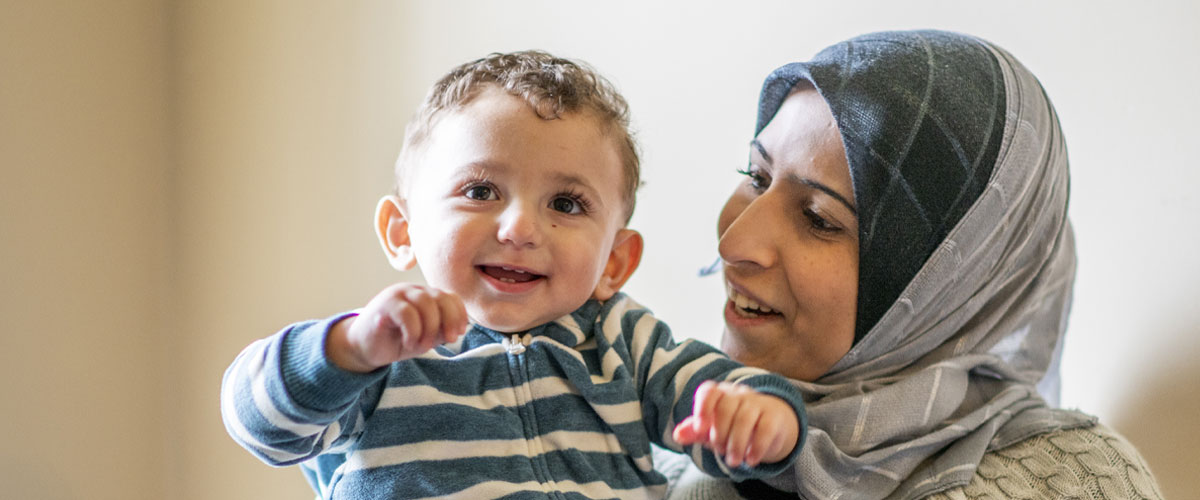
|

|
Your baby is now a year and a half old! Wow!
You may be starting to see more of their little personalities start to shine through. It’s a very exciting and busy age!
This month we’ll be talking about milestones, a nutrition screening, and how to work through meltdowns.
It is also time to complete your child’s 18-month LookSee checklist.
By 18 months, does your child:
- Identify pictures in a book? (“show me the baby”)
- Use a variety of familiar gestures? (waving, pushing, giving, reaching up)
- Follow directions using “on” and “under”? (“Put the cup on the table”)
- Make at least four different consonant sounds? (b,n,d,h,g,w)
- Point to at least three different body parts when asked? (“where is your nose?”)
- Say 20 or more words? (words do not have to be clear)
- Hold a cup to drink?
- Pick up and eat finger food?
- Help with dressing by putting out arms and legs?
- Walk up a few stairs holding your hand?
- Walk alone?
- Squat to pick up a toy and stand back up without falling?
- Push and pull toys or other objects while walking forward?
- Stack three or more blocks?
- Show affection towards people, pets, or toys?
- Point to show you something?
- Look at you when you are talking or playing together?
Follow up with your health care provider if you answered “no” to any of these questions or if you have concerns about your child’s development. If you are interested in completing Looksee Screenings as your child gets older, you can call the Parenting in KFL&A Phoneline at 613-549-1154 to speak to a Registered Nurse.
By this age, your child is probably starting to use words and gestures to communicate with you. If you want to learn more, or if you are concerned about your child’s development, connect with Early Expressions at KidsInclusive. Their website has more information about communication milestones, strategies to use at home, and a self-referral form for their free programming. Children develop at different rates, but it’s best to get help early. |
Appointment alert!
Have you booked your special 18-Month Well-Baby Visit? This a longer visit where you’ll have a chance to talk to your health care provider about your baby’s growth and development.
Your child will also receive their last dose of the Pediacel immunization. This is the last immunization due before your child attends school. Your child is now protected against many diseases – hurray! |

|
Help your child recognize and work through their emotions. All feelings matter.
At this age, your child is starting to have ideas about what they want to do, but they still don’t have the words to tell you. This can lead to some pretty big emotions, and even some meltdowns. It’s good to remember that all emotions are healthy and important - even anger, frustration, and sadness.
When your child is upset, try these steps:
- Be calm.
- Listen to your child.
- Help them find the words for how they are feeling.
- Let them know you are there to help.
Try the following tips to help your child cope with their feelings:
- Name your child's emotions, for example, "It looks like you are frustrated with that toy" or “Oh, you look excited to see grandma!”
- Let your child know that their feelings are okay, for example, "I know it can be sad when your milk spills. I'd be sad too."
- Teach your child ways to calm down. For example, taking deep breaths or slowly counting to five.
- Hug your child. Sometimes a cuddle and attention from you can fix anything!
|
Changes in routines
Many families may be having changes in routines as your baby is getting older. Nap routines may be shifting, or parents may be returning to working outside of the home. Here are some ideas that may help:
- Making a meal with leftovers might help with busy nights in the future.
- Reach out for help. Family and friends may be able to lend a hand. They may be waiting for you to ask.
- It’s okay to say “no”. It’s okay to turn down that outing or potluck. Being social is important, but not if it’s making you feel overwhelmed.
This is a busy season of life, and it’s impossible to get everything done. So, make sure to allow yourself time for a break and know it's okay to only do what you can. |
Links we love!
The Maltby Centre offers free mental health and autism services. They also offer many free parent education classes – virtual and in person. |
Currently, our e-mails only go up to 18 months. We are working on adding more! Thank you for inviting us on this journey with you, and all the best in the future! |
KFL&A Public Health, 221 Portsmouth Avenue, Kingston, Ontario K7M 1V5
|
|
|
|
|